World Press Freedom Day which falls on May 3 was marked today at the Bandaranaike Memorial International Conference Hall.
The event was graced by the participation of senior officials of the European Union and UNESCO representatives as well as award-winning journalist and Deputy Editor of the Sunday Times Namini Wijedasa.
The event themed "Journalism Under Digital Siege" was organized by the Sri Lanka Press Institute.
Marking World Press Freedom Day, a special keynote address given by Namini Wijedasa, Deputy Editor (Investigations) of the Sunday Times is reproduced below:
Distinguished members of the audience, colleagues and friends,
The theme for this year’s World Press Freedom day is ‘Journalism under Digital Siege’. It refers to multiple ways in which surveillance and digitally mediated attacks endanger journalists and journalism.
I’m not going to keep to the theme. I’m going to talk, here among friends, about keeping the faith.
The threats we face are multifaceted. Digital is one of them and admittedly the most complex. I’ve been told to change my phone, my phone number, to use various apps that might keep my interactions safer and to secure my accounts.
We do what we can. But the danger evolves, often before our eyes, and it is exhausting to keep up. Journalists have to conduct the various facets of our profession like a Mafia boss runs his operations without a fraction of the resources a Mafia boss has.
How do we exchange documents securely? How do we ensure our interactions are not compromised if our devices are taken over? How do we protect our sources? How do we protect ourselves? How do we survive the relentless online attacks, with our mental health intact? Who do we trust? How do we just-keep-reporting?
Journalists and experts better versed than I am are grappling with digital safety. And I don’t think we have an answer because every new day throws up a new challenge, on top of the mountain of hurdles that has been piling up over the decades.
But it’s important to keep trying. To keep doing what we do. And I’ll tell you why. From my experience.
I report on corruption. It’s a thankless job. I often say that being an investigative journalist is a lonely existence. It can be. It is also frustrating. Because corruption rules the world. And because corruption, particularly in this part of the globe, has gotten so progressively bad that solutions seem completely out of reach.
Many are the times I’ve asked my editor, “What is the bloody point? Why do we do this?” And many are the times he has replied, “Because it’s our duty. We do what we can.”
Journalism, when done right—without the freebies, the influence-peddling, the discounts, the complimentary hotel stays and restaurant meals, the festival hampers, the selfie and photo ops—is not a glamourous career. It’s hellishly difficult to cultivate contacts, to build trust, to get your hands on the documents, to do the number-crunching, to think like a criminal so you can get as close to the story as you possibly can.
As for security, the unknown threat is as cripplingly worrying as the known one. Where will it come from? What will they use?
Our families also suffer. It’s not a normal existence that we lead, particularly if we take the job seriously. It extends after-hours and the frustrations, the fears, the despair, can impact on spouses and children. Without their support and understanding, our work would be that much harder.
Yet we do what we can.
Because amidst all these, there is great usefulness in the role we play. Because…imagine if we didn’t exist. If we didn’t take the risks and do the hard work, even the information that is now available, that allows voters to make informs decisions, that educates the public, will be missing from discourse. Then what?
Of course, the age of social media means that information reaches the public in some form. But social media has not eradicated the need for professional journalism--the type of journalism that doggedly verifies, substantiates, cross-checks with multiples sources and presents news in a form that can be relied upon.
Sri Lanka is going through dire turmoil. The main reason for widespread misery is economic—arising from furiously bad policy, mismanagement, sheer pigheadedness and a frankly inexcusable lack of planning and preparedness. The government was grossly negligent. And now we are running out of fuel, food and medicine.
But amidst the obvious debates and analysis on economic strategy and failures is another LOUD conversation about corruption. The emptiness of the state coffers has prompted a tsunami wave of anger and discontent over inflated tenders, commissions—the dressy term for bribes—vanity projects and their predictable lack of returns, bid-rigging and an enrichment of the ruling class that is disproportionate to their incomes. Suddenly, everyone wants to follow the money.
Wait? Isn’t that what we journalists have done for years? And, for the most part, was gone unheard or ignored? Yes. Yes, it is. Yes it was.
But it doesn’t matter. Because a crucial lesson the Sri Lankan crisis taught me is that what I write may not be accepted or even noticed at a particular point of time but it will eventually matter, sooner or later. And the reasons for this may vary.
In Sri Lanka, citizens have overnight started to make the connection between corruption and the depletion of reserves, the absence of money to pay off the loans taken to build those corruption-riddled, cost-inflated roads or other infrastructure.
Increasingly more people now realize that the terms of those contracts were shrouded in secrecy. That the competitive procurement process was set aside by a handful in power so that these projects could be parceled out to identified companies that were happy to oil the right palms. And that the bribes were often used for purchase of property and other assets. Or lie deposited in offshore accounts, untaxable, while the rest of the populace starves. And pays off the loans. Mindsets are changing. That is a huge victory in itself.
And when citizens look for a reference point, they find our work. I have had ordinary people reaching out to me for articles I wrote in the past, asking to know more. Social media has helped to spread information far and wide. People want verified, professionally executed pieces of work published in reliable media under names you can trust.
It gives journalists like us some sense of gratification and restores our sense of purpose. Because, let us be honest, this job—especially in our part of the world—pays peanuts. For those of us who don’t do it for the freebies but in the hope that our journalism will bring about positive change impacting the lives of ordinary people, of our own children, the only reward IS change.
Sri Lanka isn’t there yet. So let me dampen my enthusiasm with a characteristic dash of pessimism flavoured with cynicism. I don’t know if things will change. Because journalists more experienced, more senior than I am will tell you they’ve been here before. And that 20, 30, 40 years down the line, we haven’t really seen meaningful structural or behavioral adjustments.
It is tempting to give up. But it’s not necessarily true that change didn’t or doesn’t occur. In Sri Lanka, there have been past administrations that introduced laws, set up or strengthened institutions, devised and implemented strong policy and made strides in the right direction. Some of this was reversed, some of it was not. It happens in cycles.
So do we give up? No. We do what we can. We aim for the next cycle. Because amidst the confusion, the chaos, the anger and the emotion, we journalists help bring some clarity and to shine a light on the FACTS. We are trained for it. To decipher, to untangle the hidden webs. We have the access. We have the right. We have the skill. We have the power.
When we chose this profession we also subscribed to the duties and responsibilities that came with it. For me, there are no two ways to do this.
Do we pay a price? Yes, we do. And being under digital siege is just one of them. Another, particularly in Sri Lanka, is the absence of whistleblower protection. Even in countries where such legislation is available, implementation isn’t ideal. Where such safeguards haven’t even been conceptualized, the journalistic pursuit of information is infinitely more difficult. Sources demand anonymity almost by default. Consequently, the journalist—and his or her institution—absorbs a great degree of risk.
Despite this, a brave few continue to approach us, leak information and documents, help us along with our stories and spread awareness. Obviously, we need to be careful of motives, to not be tools. But there are time-tested templates to guide us through the obvious pitfalls.
In Sri Lanka, today, people who never paid attention to the work of journalists are asking us to do more. The demand for quality work has exploded. Not the resources. Not the number of people entering and staying on in journalism. Not the quality of protection. There are no guarantees. Our newsrooms are stretched to their maximum.
But I’m not here today to tell you not to do it. I’m here to encourage you, and above all myself, to keep at it. To keep renewing your sense of purpose because WE ARE IMPORTANT in this equation. To keep saying continue digging, continue searching, continue shining that light. On those dark days when you come home thinking, ‘Man, I’ve failed again’, look into the eyes of babes and think, ‘That’s ok, I’ll try again’.
We have spent decades dissecting the threats and looking for the best solutions. That must continue. But alongside it, we journalists MUST do what we do best—that is, reporting the truth. Keep the faith.
WE MUST DO WHAT WE CAN.
(Pix by Indika Handuwala)
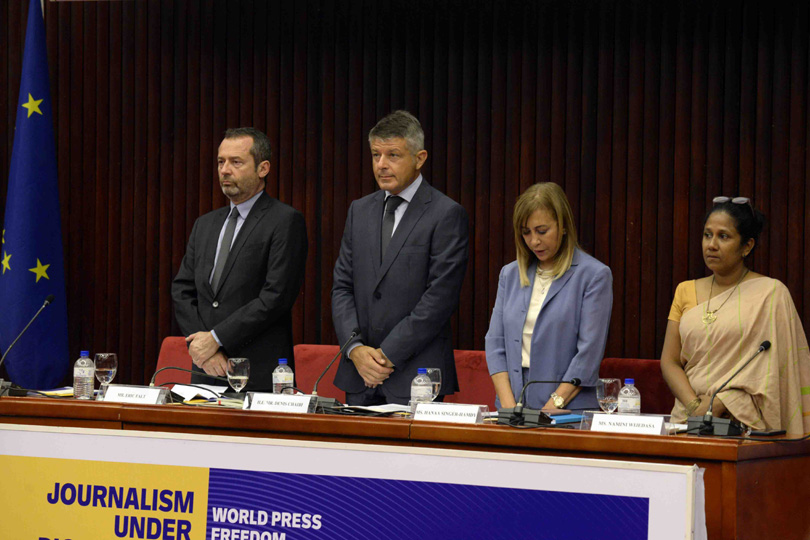
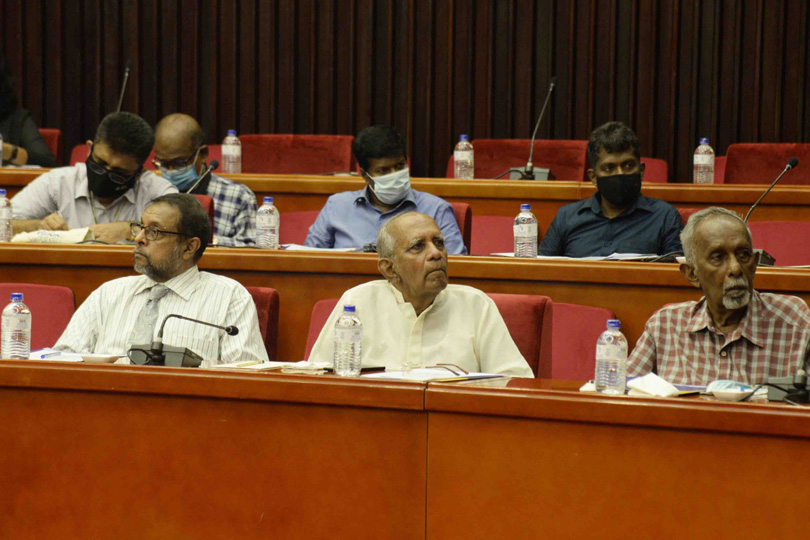
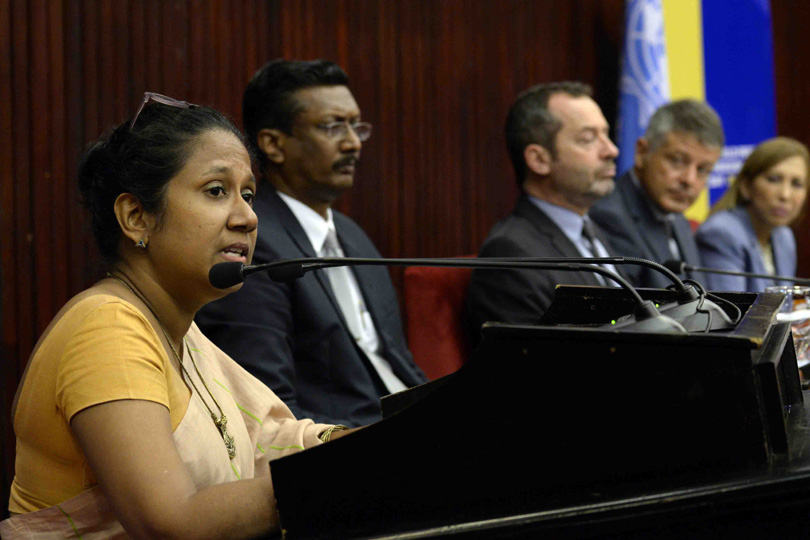
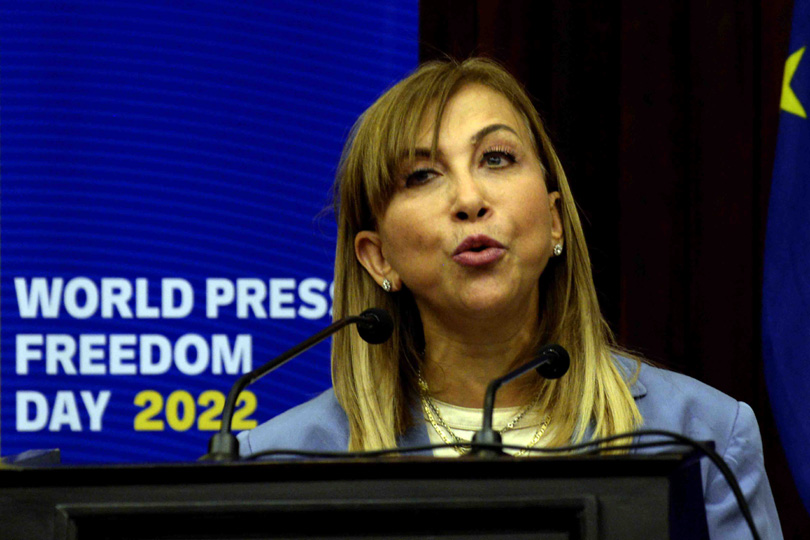
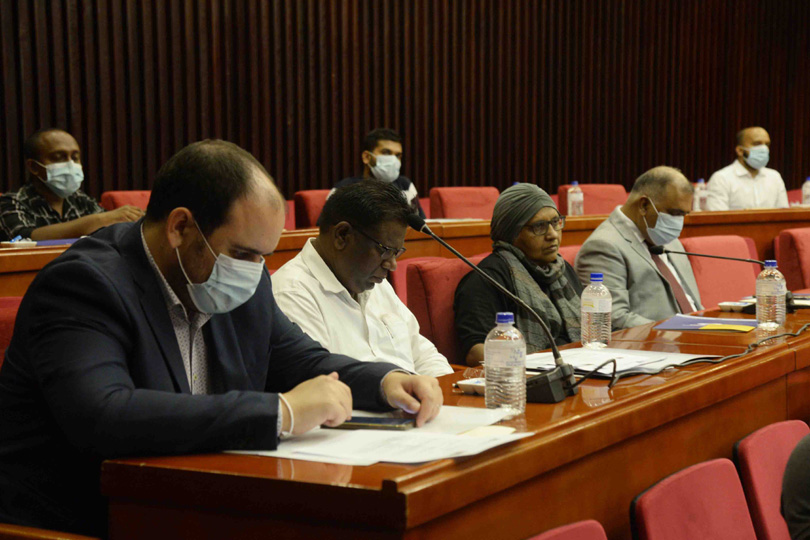
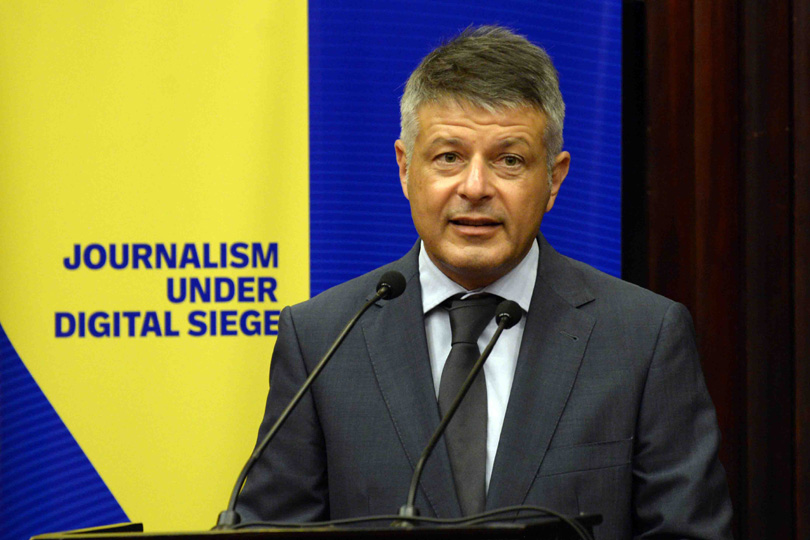
Leave Comments